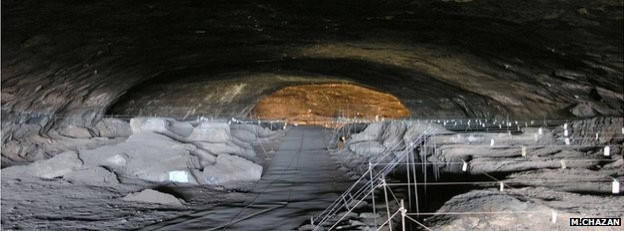Humans Used Fire 300,000 Years Earlier Than Previously Thought: 'It Kind Of Changes How We View Our Place'

Early human ancestors harnessed the power of fire much earlier than previously thought, according to a new study. Ash and bone fragments recovered from a cave in South Africa suggest to researchers that humans used fire for cooking almost a million years ago --300,000 thousand years earlier than previously thought.
Researchers made the discovery in the famed Wonderwerk Cave, a site archeologists have excavated since the 1940s. The cave is 456 feet (139 meters) deep and contains evidence of having been lived in almost two million years ago.
Researchers found ash made from burnt grass and leaves 100 feet (30 meters) inside the cave. The ash has jagged edges, which shows that they were burnt in the cave and not blown in, which would have worn the edges away, researchers said. They also found human bone fragments that contained large crystals of hydroxylapatite, a kind of mineral that only crystalizes when it is heated above 750 degrees.
The archeologists then searched for bat guano, which can spontaneously ignite, but found none.
The analysis pushes the timing for the human use of fire back by 300,000 years, suggesting that human ancestors as early as Homo erectus may have begun using fire as part of their way of life, Michael Chazan, study coauthor and archeologist at the University of Toronto, told Fox News.
The discovery of fire is an important turning point in human history. The ability to cook food would have kept our ancestors warm and give them more energy, since cooking releases nutrients and calories.
Fire is more than simply a pleasant luxury - we have pretty good evidence that it was the basis for a tremendous number of changes in human evolution, Richard Wrangham, evolutionary anthropologist at Harvard University, who was not involved in the study, told the Los Angeles Times.
Cooking food means less time spent chewing, which could be the reason for smaller teeth, Wrangham said. In addition, fire helped previously nomadic humans become settlers.
Socializing around a campfire might actually be an essential aspect of what makes us human, Chazan told Fox News.
Some scientists have said that the researchers are drawing too wide of a conclusion, and that more research needs to be done before they make a concrete claim.
I think it likely that humans were using fire at this site, but I don't think that this means these [early humans] were regular fire users, Wil Roebroeks, archaeologist at Leiden University, told Nature. For a claim like that to be made, we would need to see hearths and fire places, and we do not. If we were to discover many more fire sites at this time in history and find that natural cave fires look distinctly different, that would support an early-cooking hypothesis, but we are not there yet.
The earliest concrete evidence of fire use dates back 400,000 years, according to the study. While there are signs of fire use that date back between 1 million and 1.5 million years ago in South Africa and between 700,000 and 800,000 years ago in Israel, the findings were outside, where lightning could have started the fire. This new discovery is unique because there is no place for outside ignition, according to the study.
Chris Organ, an evolutionary biologist at the University of Utah, who was not involved in the study, told the Los Angeles Times that if human ancestors used fire, it calls into question our perception of their intellectual ability.
If you can say, 'Sorry, Homo sapiens, you didn't invent fire,' it kind of changes how we view our place and what defines us, he said.
The journal Proceedings of the National Academy of Sciences published the study on Monday.
© Copyright IBTimes 2025. All rights reserved.





















